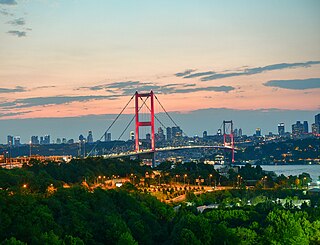
Turkey is a founding member of the OECD and G20. The country's economy ranked as the 18th-largest in the world and 8th-largest in Europe by nominal GDP in 2023. It also ranked as the 11th-largest in the world and 5th-largest in Europe by PPP in 2023. As of 2024, Turkey is a developing, upper-middle income, mixed economy. Turkey has often been defined as a newly industrialized country since the turn of the 21st century. The country is the fifth most visited destination in the world, and has over 1,500 R&D centres established both by multinational and national firms. Turkey is among the world's leading producers of agricultural products, textiles, motor vehicles, transportation equipment, construction materials, consumer electronics, and home appliances. Among OECD nations, Turkey has a highly efficient and strong social security system; social expenditure stood at roughly 12.5% of GDP.
Hacı Ömer Sabancı Holding A.Ş., commonly abbreviated as Sabancı Holding, is an industrial and financial conglomerate with headquarters in Istanbul, Turkey. The company's primary activities are in financial services, energy, cement, retail and industrial sectors. The founding Sabancı family continues to hold a majority stake. Sabanci Holding was first listed on the Istanbul Stock Exchange (BIST) in 1997. As of the year 2023, Sabancı Group operates in 14 countries across 5 continents, serving more than 40 million customers and providing employment for over 60,000 people. Additionally, the holding has joint venture partnerships with prominent global players such as E.ON, Bridgestone, Ageas, Heidelberg, and Carrefour.
Alarko Holding is one of the largest business conglomerates in Turkey; it is listed on the Istanbul Stock Exchange. It operates in a variety of sectors, including construction, electricity generation and distribution, tourism, and real estate. It was founded by İshak Alaton and Üzeyir Garih in 1954.

Kalyon Group is a Turkish conglomerate, with major interests in construction. It was founded by Ömer Faruk Kalyoncu.

Ciner Group is a Turkish family-owned conglomerate that operates in five main sectors: energy and mining, natural soda ash, glass and chemicals, maritime and shipping, and news and entertainment media. Ciner Group was formed in 1978 and is majority-owned by Turgay Ciner.
Limak Holding A.S. is a Turkish conglomerate, with major interests in construction, energy, cement, and tourism. Its assets include the Limak Cement and Limak Energy companies and the Limak Tourism Group. In 2012, it had around $260m revenue from construction.

Renewables supply a quarter of energy in Turkey, including heat and electricity. Some houses have rooftop solar water heating, and hot water from underground warms many spas and greenhouses. In parts of the west hot rocks are shallow enough to generate electricity as well as heat. Wind turbines, also mainly near western cities and industry, generate a tenth of Turkey’s electricity. Hydropower, mostly from dams in the east, is the only modern renewable energy which is fully exploited. Hydropower averages about a fifth of the country's electricity, but much less in drought years. Apart from wind and hydro, other renewables; such as geothermal, solar and biogas; together generated almost a tenth of Turkey’s electricity in 2022. Türkiye has ranked 5th in Europe and 12th in the world in terms of installed capacity in renewable energy. The share of renewables in Türkiye’s installed power reached to 54% at the end of 2022.

Turkey uses more electricity per person than the global average, but less than the European average, with demand peaking in summer due to air conditioning. Most electricity is generated from coal, gas and hydropower, with hydroelectricity from the east transmitted to big cities in the west. Electricity prices are state-controlled, but wholesale prices are heavily influenced by the cost of imported gas.
The Eti Soda Inc. is a chemical industry company in Ankara Province, Turkey producing natural soda ash and baking soda from trona. It was founded in 1998, and the production started in 2009. The company's main shareholder is Ciner Group.

Coal, cars and lorries vent more than a third of Turkey's six hundred million tonnes of annual greenhouse gas emissions, which are mostly carbon dioxide and part of the cause of climate change in Turkey. The nation's coal-fired power stations emit the most carbon dioxide, and other significant sources are road vehicles running on petrol or diesel. After coal and oil the third most polluting fuel is fossil gas; which is burnt in Turkey's gas-fired power stations, homes and workplaces. Much methane is belched by livestock; cows alone produce half of the greenhouse gas from agriculture in Turkey.

Coal supplies a quarter of Turkey's primary energy. The heavily subsidised coal industry generates over a third of the country's electricity and emits a third of Turkey's greenhouse gases.
The Zonguldak Eren Termik Santrali (ZETES) power stations in Zonguldak are 3 coal-fired power stations in Turkey totaling 2790 MW owned by Eren Holding via Eren Enerji.
Emba Hunutlu power station is a 1320 MW coal fired power station in Turkey in Adana Province. As of 2022 it is the largest Chinese foreign direct investment in the country. Despite opposition from many environmental organisations the plant was started up in 2022 and burns Russian coal as it is cheaper than other coal. The plant is less than 2 km from another coal-fired power station, İsken Sugözü.
Eren Holding is a conglomerate headquartered in Istanbul, Turkey. It has business interests in paper, packaging, cement, energy, retail and textiles. The holding company was established in 1997, although the history of the group dates back to 1969.
İsken Sugözü power station is a 1320 MW operational coal fired power station in Turkey.

IC Holding, is a private conglomerate in Turkey including construction, electricity generation and tourism. It was founded by the current Chairman İbrahim Çeçen. İbrahim Çeçen's son, Fırat Çeçen is the Vice Chairman, who is also the Chairman of IC Ibrahim Cecen Investment Holding.
Soma Kolin power station is a 510-megawatt coal-fired power station in Turkey in Manisa Province, which burns lignite mined locally. The planned original site was changed after local protests. Both units were funded by Turkish banks, built by Harbin Power Equipment, are subcritical and started generating in 2019.
Cenal power station is a 1320-megawatt coal-fired power station in Turkey in Çanakkale Province, which burns imported and local coal. The plant was financed by Turkish banks and is owned by Cengiz Holding and Alarko Holding and receives capacity payments. Environmentalists, such as Greenpeace, attempted to stop construction with protests, and legal action against the environmental impact assessments. Cenal is on the Global Coal Exit List. It is estimated that closing the plant by 2030, instead of when its licence ends in 2062, would prevent over 4000 premature deaths.
Atlas power station or Atlas Enerji İskenderun power station is a 1200-megawatt coal-fired power station in Turkey in İskenderun in Hatay Province, which burns imported and local coal and receives capacity payments. Construction was financed by Garanti Bank, Akbank and Işbank.
İzdemir power station is a 350-megawatt coal-fired power station in Turkey in İzmir Province, which burns imported coal. Although coal is the prinary fuel the plant can also run on fossil gas.








